Save the Children International says massive cholera outbreaks in Sudan and Nigeria are killing thousands of children as death rates soar up to three times the global average and cases continue to rise. are sounding the alarm that they are in danger.
It also said conflict and flooding were hindering access to treatment.
Latest data from Sudan shows that the case fatality rate (CFR) is 3.1 deaths per 100 confirmed cases, well above the minimum standard of 1 death per 100 confirmed cases (or 1%). The case fatality rate for the outbreak in Nigeria is 2.9. % (1), which is also nearly three times the minimum standard.
Approximately 16 countries in West, Central and East Africa, including Sudan and Nigeria, have experienced unprecedented flooding in recent months due to the growing effects of climate change. According to UN data, more than 4.4 million people in West and Central Africa and more than 2 million people in East Africa will be affected by flooding by 2024.
Floods, contaminated water, and inadequate sewage treatment have led to a surge in cholera cases that could be treated with proper access and quality care, but are not available in parts of Sudan and Nigeria, leaving children under the age of five Child mortality is rising. unduly influenced.
More than 17,600 cholera cases and 546 related deaths were reported in Sudan between July 22 and September 29 in 10 states and 60 regions, according to the Federal Ministry of Health and WHO.
At least 80% of Sudan’s hospitals are now closed, with at least 80% of Sudan’s hospitals now closed, as a deadly combination of destruction of health facilities, flooding and water pollution caused by nearly 18 months of violence has fueled the outbreak. The most basic medical supplies are in short supply.
In September, Save the Children teams in El Damer and Gedarif, Nile Region, witnessed a sharp rise in cholera infections among children under five, accounting for 15% of confirmed cases and deaths nationwide. (3). .
In Nigeria, the outbreak has been linked to mass displacement caused by widespread flooding that affected 29 of the country’s 36 states, primarily in the northern region.
By October 1, Nigeria had more than 450 confirmed cases (4), including 32 deaths, with children accounting for 37% of confirmed cases. The situation was expected to worsen further in October as rain continued across northern Nigeria, causing further flooding and evacuations.
Mohamed Abdiradif, Save the Children’s interim country director in Sudan, said:
Shortages of critical medicines, combined with hunger and malnutrition, are putting millions of children at risk of illness and death.
He said health teams across the country have told him that most deaths from childhood cholera are due to other complications due to weakened immunity due to malnutrition.
“For children, a broken health system not only means they cannot receive emergency care, but also access essential everyday services, such as life-saving vaccinations for children under five and obstetric care for pregnant mothers. hindering.
“Cholera, measles and dengue cases have risen sharply in recent months, and hundreds of people are now dying from completely preventable causes,” he said.
Duncan Harvey, Country Director for Save the Children in Nigeria, said cholera outbreaks are preventable with proper infrastructure and hygiene practices. However, floods in Nigeria are worsening the lives of the most vulnerable people, especially children in northeastern Nigeria.
“Children are already suffering from widespread malnutrition and disease due to lack of food and clean water. We call for accelerated action.
“We urge the public to take precautions and seek immediate medical attention if symptoms occur.”
“In Sudan, Save the Children tested, monitored and chlorinated 35 water sources in the Sawakin district of Red Sea State, disposing of 125 tonnes of solid waste.
“In Gedarev Oblast, Save the Children is treating cholera cases and providing safe drinking water to cholera treatment centers. Aid agencies also provide cash assistance to families for essentials such as food and water. I am doing it.
“In Nigeria, Save the Children is providing relief supplies to displaced people in the worst-hit Adamawa and Yobe states, distributing medicines, medicines and household items such as cholera kits.
“We are trucking water to flood-evacuated areas, conducting hygiene promotion campaigns and disinfecting water sources to improve access to safe drinking water,” he said. said.
WhatsApp Email LinkedIn Twitter Facebook
Source link

